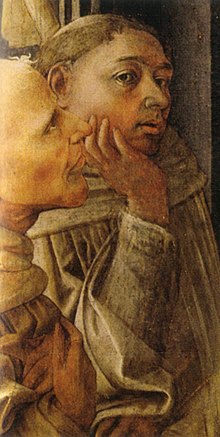Filippo Lippi
| Fra' Filippo Lippi, O.Carm. | |
|---|---|

Selfportrait of Fra' Filippo Lippi
|
|
| Born |
Filippo Lippi ca. 1406 Florence, Republic of Florence |
| Died | 8 October 1469 (aged 62–63) Spoleto, Papal States |
| Nationality | Italian |
| Known for | Painting, Fresco |
| Notable work | Madonna and Child Enthroned, Annunciation |
| Movement | Early Renaissance |
Fra' Filippo Lippi, O.Carm. (c. 1406 – 8 October 1469), also called Lippo Lippi, was an Italian painter of the Quattrocento (15th century).
Lippi was born in Florence in1406 to Tommaso, a butcher, and his wife. When he was still a small child, both his parents died. He was sent to live with his aunt Mona Lapaccia; however because she was too poor to rear him, she placed him in the neighboring Carmelite convent. He was 8 years old when he left for the convent and started his education there. In 1420 he was admitted to the community of Carmelite friars of the Priory of Our Lady of Mount Carmel in Florence, taking religious vows in the Order the following year, at the age of sixteen. He was ordained as a priest in approximately 1425, and remained in residence of that priory until 1432. Georgio Vasari, the first art historian of the renaissance, writes that Lippi was inspired to become a painter by watching Masaccio at work in the Carmine church. Lippi's early work, notably the Tarquinia Madonna (Galleria Nazionale, Rome) show that influence from Masaccio. In his Lives of the Artists, Vasari says: "Instead of studying, he spent all his time scrawling pictures on his own books and those of others." Due to his interest, the prior decided to give him the opportunity to learn painting.
In 1432 Filippo Lippi quit the monastery, although he was not released from his vows; in a letter dated 1439 he describes himself as the poorest friar of Florence, charged with the maintenance of six marriageable nieces.
Lippi then went on to visit to Ancona and Naples, where he was captured by Barbary pirates and kept as a slave in Barbary. His skill in portrait-sketching helped to eventually release him. Louis Gillet, writing for the Catholic Encyclopedia, considers this account "assuredly nothing but a romance".
...
Wikipedia
